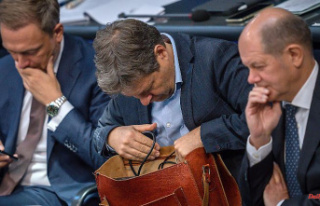According to environmentalists, it is a "partial success": In order to curb the destruction of the rainforest, fewer products from deforestation areas should reach Europe in the future. The ban ranges from cocoa to meat and leather goods. There are already ideas for further sanctions.
No rainforest should be destroyed anywhere else in the world for a cup of coffee in the EU: With this in mind, the European Parliament and the EU member states have agreed on an import ban for certain raw materials such as coffee and cocoa if forest areas have been cleared for their cultivation.
The new regulation aims to reduce the destruction of rainforest for products consumed in Europe. Coffee and cocoa, as well as palm oil and soya, should only be allowed to be imported into the European Union if they were not produced on forest areas that were deforested after December 2020. The rules should also apply to derived products such as beef, rubber and wood, as well as to leather, furniture, printed paper and charcoal.
After this agreement, the member states and the parliament still have to formally approve the law before it enters into force. Traders then have 18 months to implement the new rules. Small companies should be given more time. It is envisaged that companies will submit a declaration of due diligence to the competent authorities before importing or exporting said goods. In the event of violations, they could be fined "at least four percent" of their annual turnover in the EU and temporarily excluded from public tenders and access to public funds, according to the member states.
The EU Parliament would have liked to have made the new regulation for more forest protection even more comprehensive. During the negotiations, the parliament unsuccessfully called for European banks and insurance companies to be included in the rules. The aim was that companies only get loans if they are at low risk of contributing to deforestation. Now the European Commission is to examine in two years whether the new regulation should be extended to financial institutions in the EU.
The German Environmental Aid complained that there was "only one test order for the commission" and described the agreement as a "partial success". The environmental organization Greenpeace called on the EU to prevent "in the coming years" that companies whose products destroy the environment "receive loans from European banks". In general, however, the organization welcomed the agreement on the new rules to protect against deforestation.
The WWF also agreed. According to the environmental organization, the EU was responsible for 16 percent of global deforestation for the import of agricultural commodities such as palm oil and beef in 2017, ranking second after China.
"Today is a good day for the global protection of forests," said Federal Development Minister Svenja Schulze. "We in Europe also contribute to deforestation in Africa, South America and Southeast Asia with our consumption." Now the developing countries must be helped to prepare for the new legislation. The Ministry of Development is ready for this.
"It wasn't easy, but we delivered a strong and ambitious result ahead of the COP15 biodiversity conference in Montreal," said Christophe Hansen of the conservative EPP Group, who is responsible for the new regulation in the European Parliament. "We have to take this momentum with us to the COP15 of world biodiversity," wrote Green MEP Anna Deparnay-Grunenberg on Twitter. The UN Biodiversity Conference COP15 will take place in Montreal, Canada, on Wednesday.












